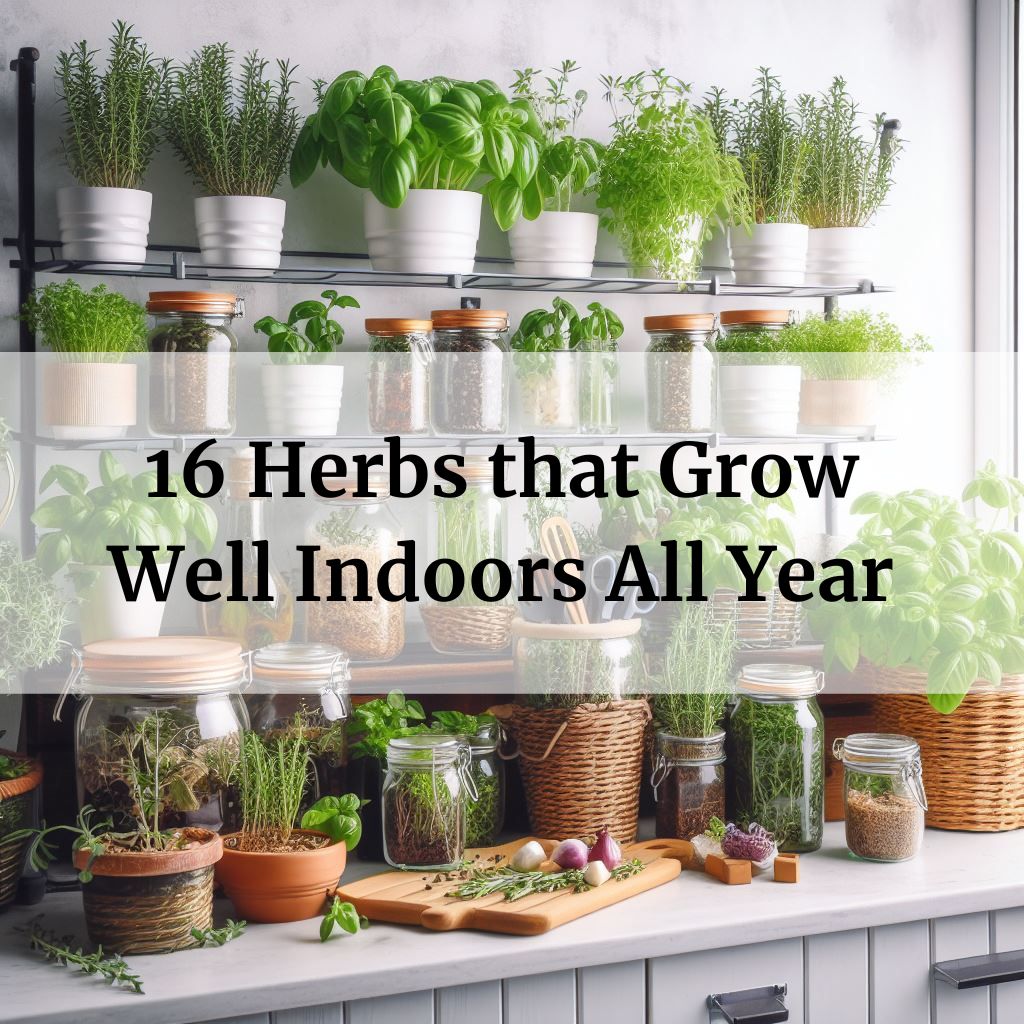
Growing your own herbs indoors is not only a practical way to have fresh flavors at your fingertips all year round, but it’s also a delightful hobby that adds a touch of greenery to your living space. In this article we list all 16 herbs that flourish all year-round when cultivated indoors. So, let’s dive right in!
In this article
- 1 Basil (Ocimum basilicum)
- 2 Catnip (Nepeta cataria)
- 3 Chives (Allium schoenoprasum)
- 4 Lemon Balm (Melissa officinalis)
- 5 Oregano (Origanum vulgare)
- 6 Rosemary (Salvia rosmarinus)
- 7 Sage (Salvia officinalis)
- 8 Spearmint (Mentha spicata)
- 9 Thyme (Thymus vulgaris)
- 10 Bay Laurel (Laurus nobilis)
- 11 Lemongrass (Cymbopogon citratus)
- 12 Marjoram (Origanum majorana)
- 13 Parsley (Petroselinum crispum)
- 14 Coriander (also known as Cilantro) (Coriandrum sativum)
- 15 Dill (Anethum graveolens)
- 16 Lavender (Lavandula)
Basil (Ocimum basilicum)

Basil is a herbaceous plant that is commonly used in Italian and Mediterranean cuisine. It has a sweet, slightly peppery flavor and is often used in tomato-based dishes, pesto, and salads. Basil is also known for its medicinal properties, including anti-inflammatory and antibacterial effects.
Flavor & Aroma: With its sweet and slightly peppery flavor, basil adds a delightful kick to Italian dishes and salads.
Goes Well With: Tomatoes, pasta, mozzarella, and pesto sauce.
Growing Tips:
- Sunlight: Basil loves sunlight, so place it near a sunny windowsill where it can soak up at least 6 hours of light per day.
- Watering: Keep the soil consistently moist, but be cautious not to overwater.
- Germination: It usually takes 5-10 days to germinate.
- Difficulty: Beginner-friendly. Basil is relatively easy to grow.
Catnip (Nepeta cataria)
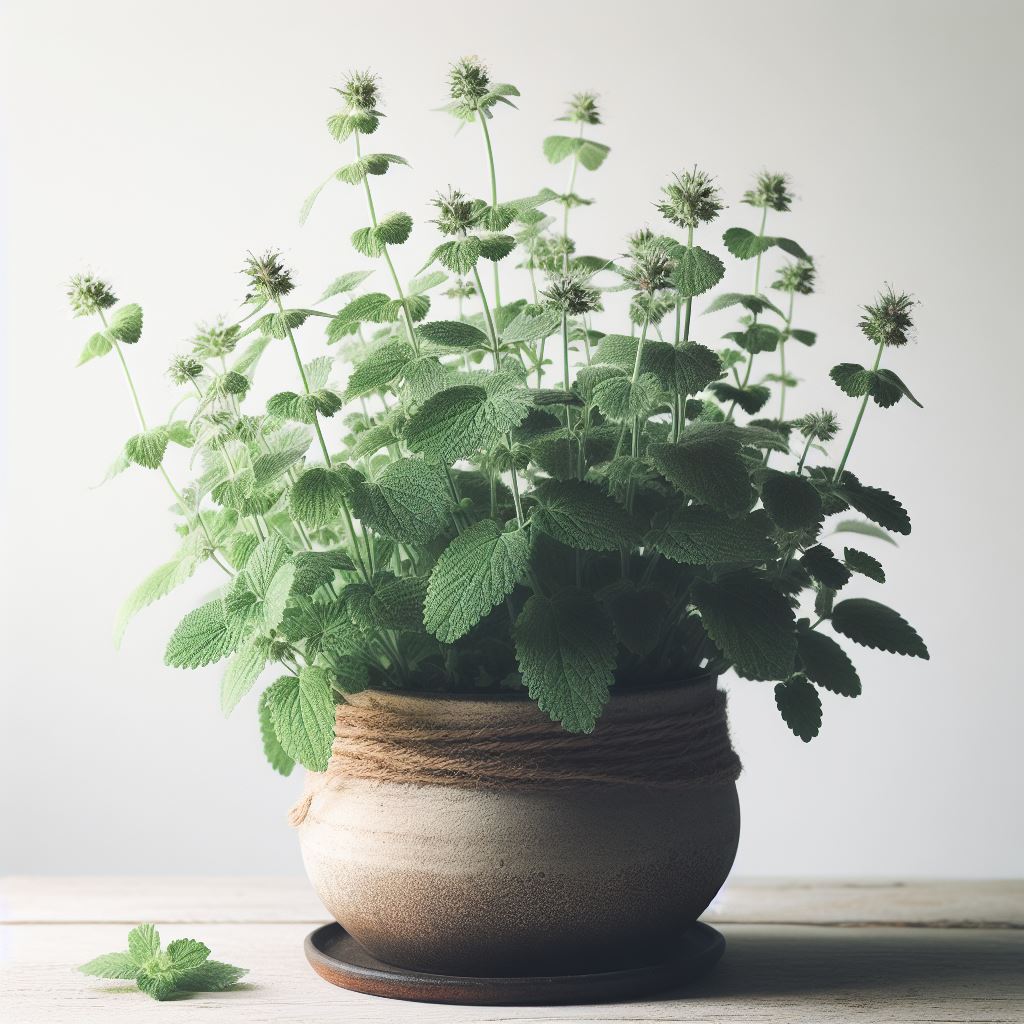
Catnip is a member of the mint family and is known for its effects on cats. However, it is also used in herbal medicine to treat a variety of ailments, including anxiety, insomnia, and digestive issues. It has a minty flavor and can be used in teas or as a seasoning for meats and vegetables
Flavor & Aroma: Catnip has a mild minty scent and flavor, making it a treat for feline friends. Goes Well With: Catnip is mainly for your furry companions.
Growing Tips:
- Sunlight: Provide it with bright, indirect sunlight.
- Watering: Keep the soil consistently moist, but don’t let it become waterlogged.
- Germination: Catnip seeds can take 7-10 days to sprout.
- Difficulty: Easy to grow, especially if you have curious cats.
Chives (Allium schoenoprasum)
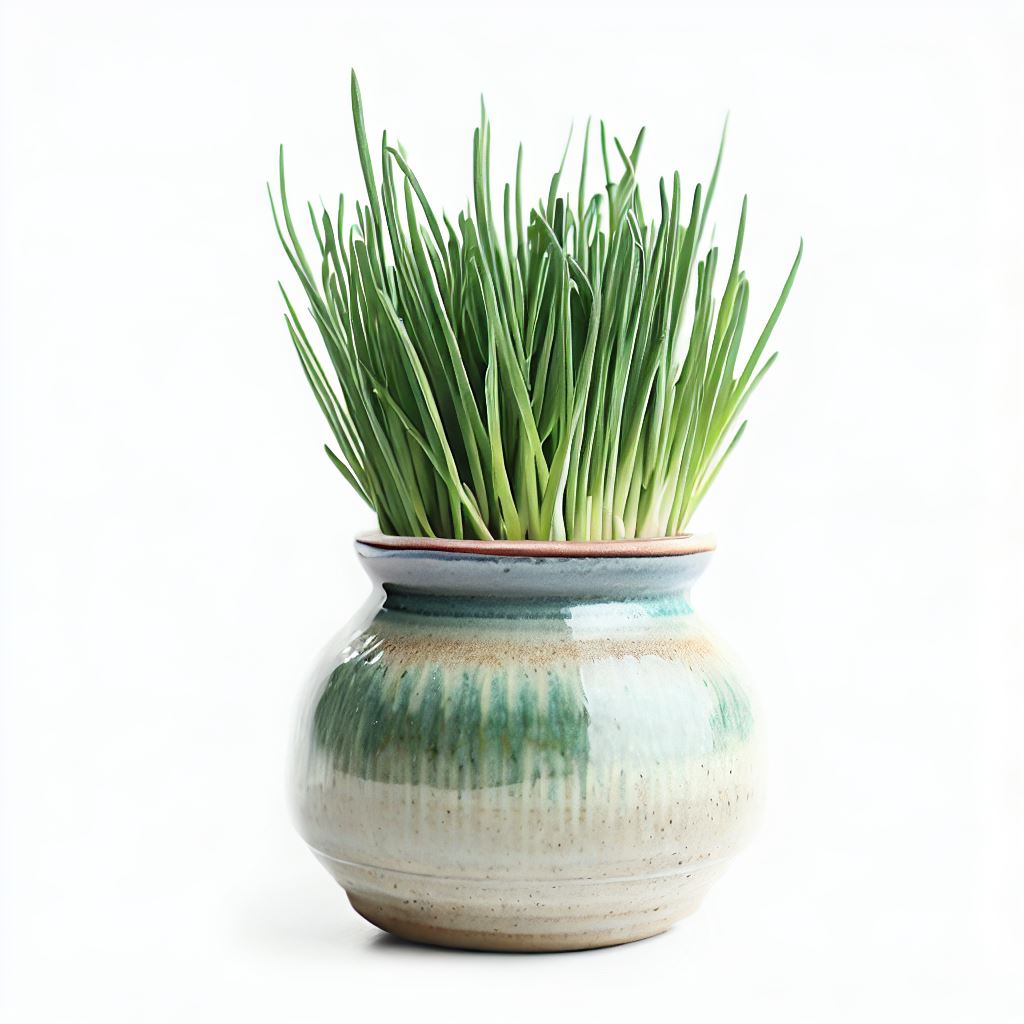
Chives are a type of onion that are commonly used as a garnish or seasoning in dishes. They have a mild onion flavor and are often used in soups, salads, and egg dishes. Chives are also a good source of vitamins A and C.
Flavor & Aroma: Chives have a mild onion-like flavor and a subtle oniony aroma.
Goes Well With: Baked potatoes, salads, and garnishes for soups.
Growing Tips:
- Sunlight: Chives require at least 4-6 hours of sunlight per day.
- Watering: Keep the soil slightly moist but not waterlogged.
- Germination: Seeds usually sprout in 7-14 days.
- Difficulty: A breeze to grow for all gardeners.
Lemon Balm (Melissa officinalis)
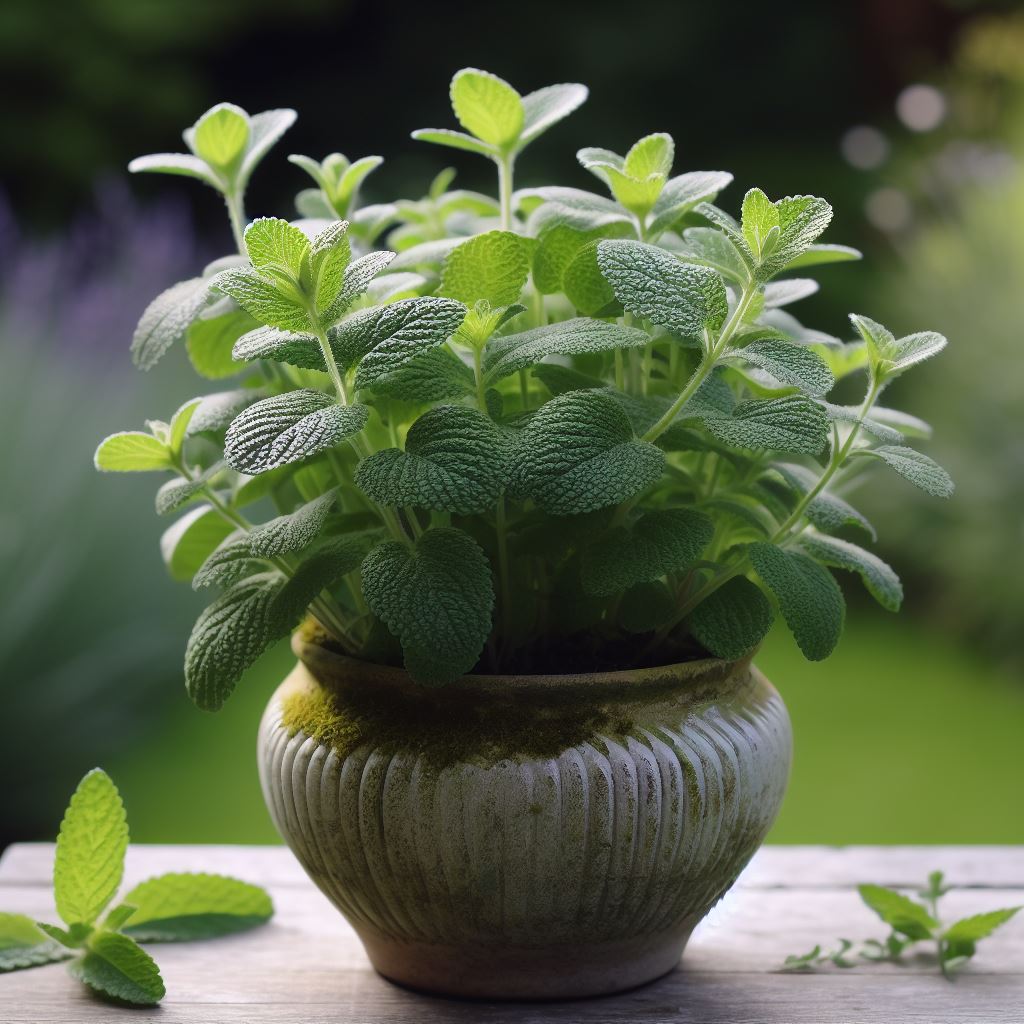
Lemon balm is a member of the mint family and has a lemony flavor. It is often used in teas and as a seasoning for fish and poultry. Lemon balm is also known for its calming effects and is used in herbal medicine to treat anxiety and insomnia.
Flavor & Aroma: Lemon balm offers a citrusy, lemony flavor and a refreshing, uplifting scent.
Goes Well With: Tea, desserts, and fish dishes.
Growing Tips:
- Sunlight: Lemon balm thrives in partial shade, but some sunlight is necessary.
- Watering: Maintain moderately moist soil.
- Germination: Seeds take 14-21 days to germinate.
- Difficulty: Beginner to intermediate level.
Oregano (Origanum vulgare)
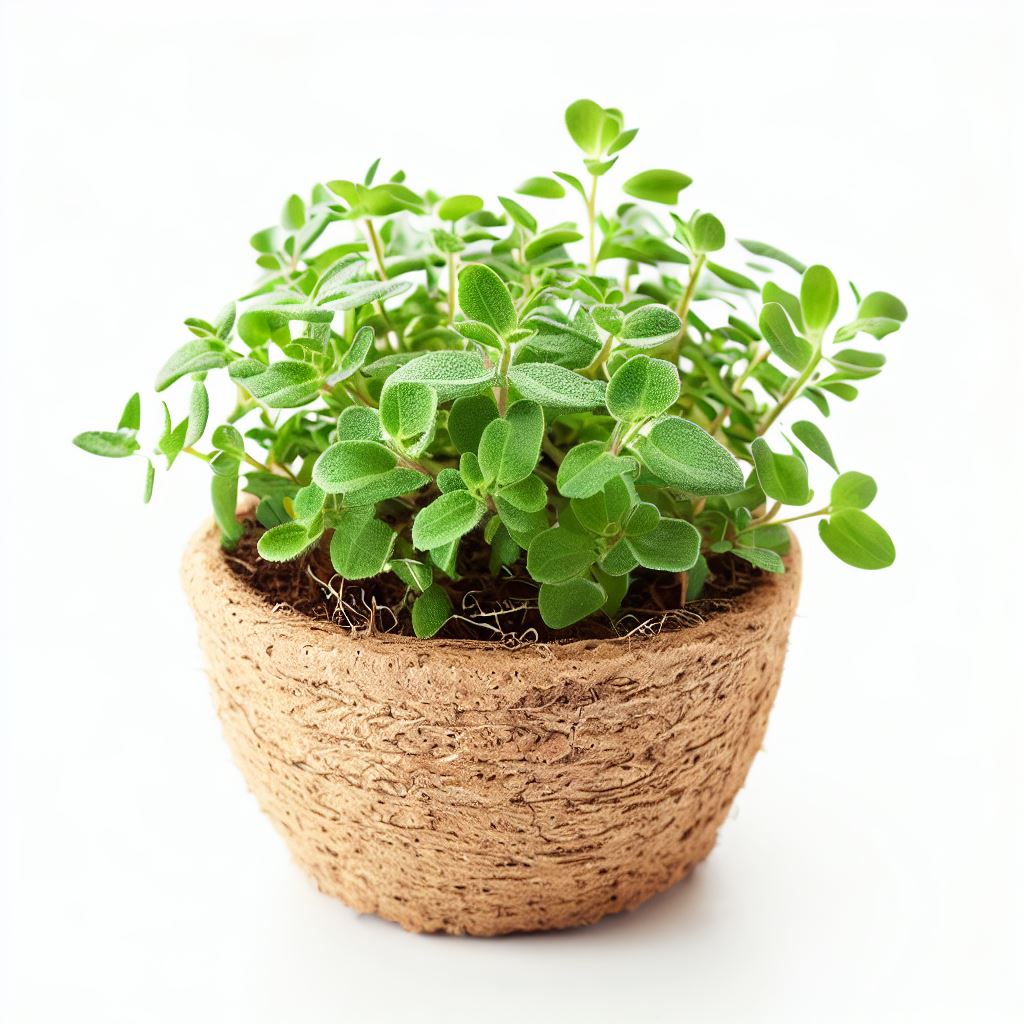
Oregano is a herbaceous plant that is commonly used in Mediterranean and Mexican cuisine. It has a strong, slightly bitter flavor and is often used in tomato-based dishes, pizza, and grilled meats. Oregano is also known for its antibacterial and antioxidant properties.
Flavor & Aroma: Oregano boasts a robust, earthy flavor and a pungent, aromatic scent.
Goes Well With: Pizza, pasta, and Mediterranean dishes.
Growing Tips:
- Sunlight: Provide it with at least 6 hours of sunlight each day.
- Watering: Allow the soil to dry out between waterings.
- Germination: Oregano seeds may take 7-14 days to sprout.
- Difficulty: Intermediate level, but worth the effort.
Rosemary (Salvia rosmarinus)
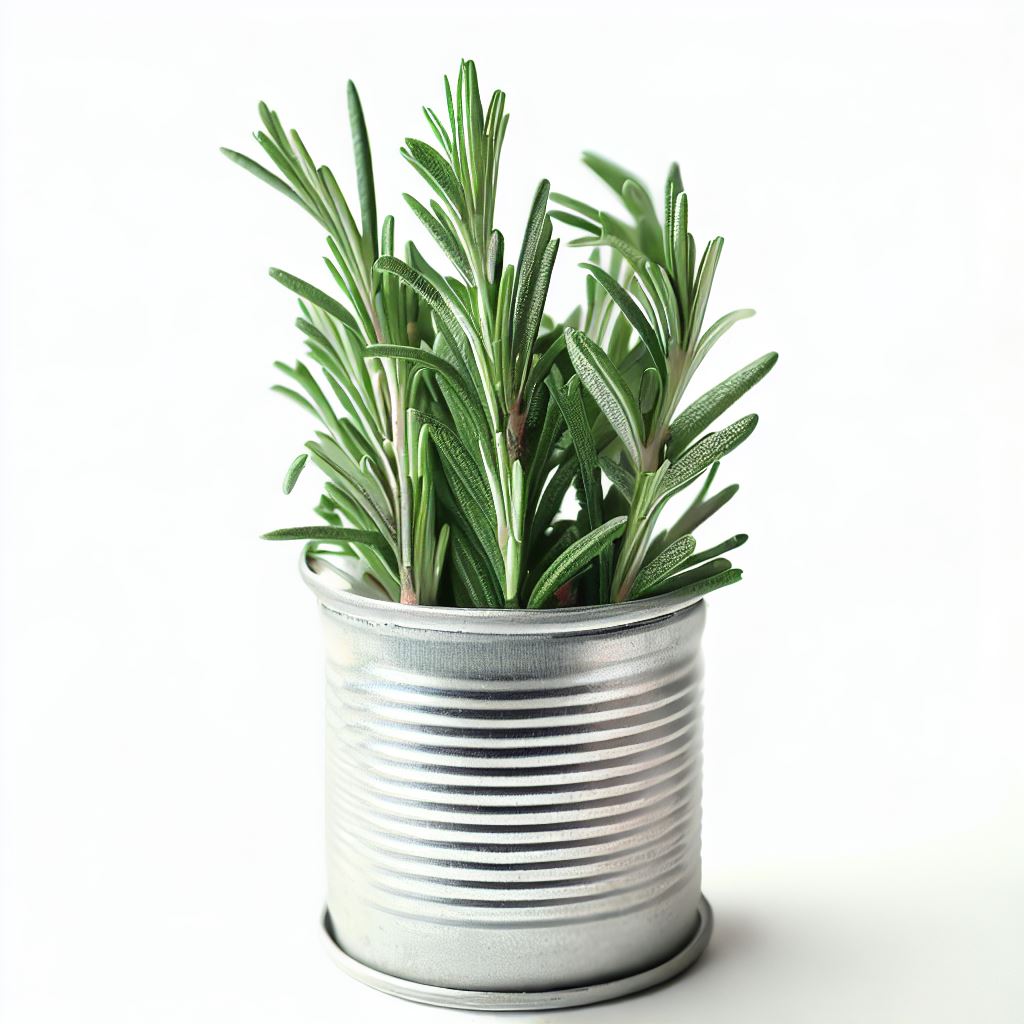
Rosemary is a woody herb that is commonly used in Mediterranean cuisine. It has a strong, pine-like flavor and is often used in roasted meats, potatoes, and bread. Rosemary is also known for its anti-inflammatory and antioxidant properties
Flavor & Aroma: Rosemary is known for its piney, woody flavor and an invigorating, evergreen scent.
Goes Well With: Roasted meats, potatoes, and bread.
Growing Tips:
- Sunlight: Rosemary loves bright sunlight for at least 6 hours per day.
- Watering: Allow the soil to dry out between waterings.
- Germination: Rosemary seeds can be slow, taking 15-25 days.
- Difficulty: Intermediate. Requires patience.
Sage (Salvia officinalis)
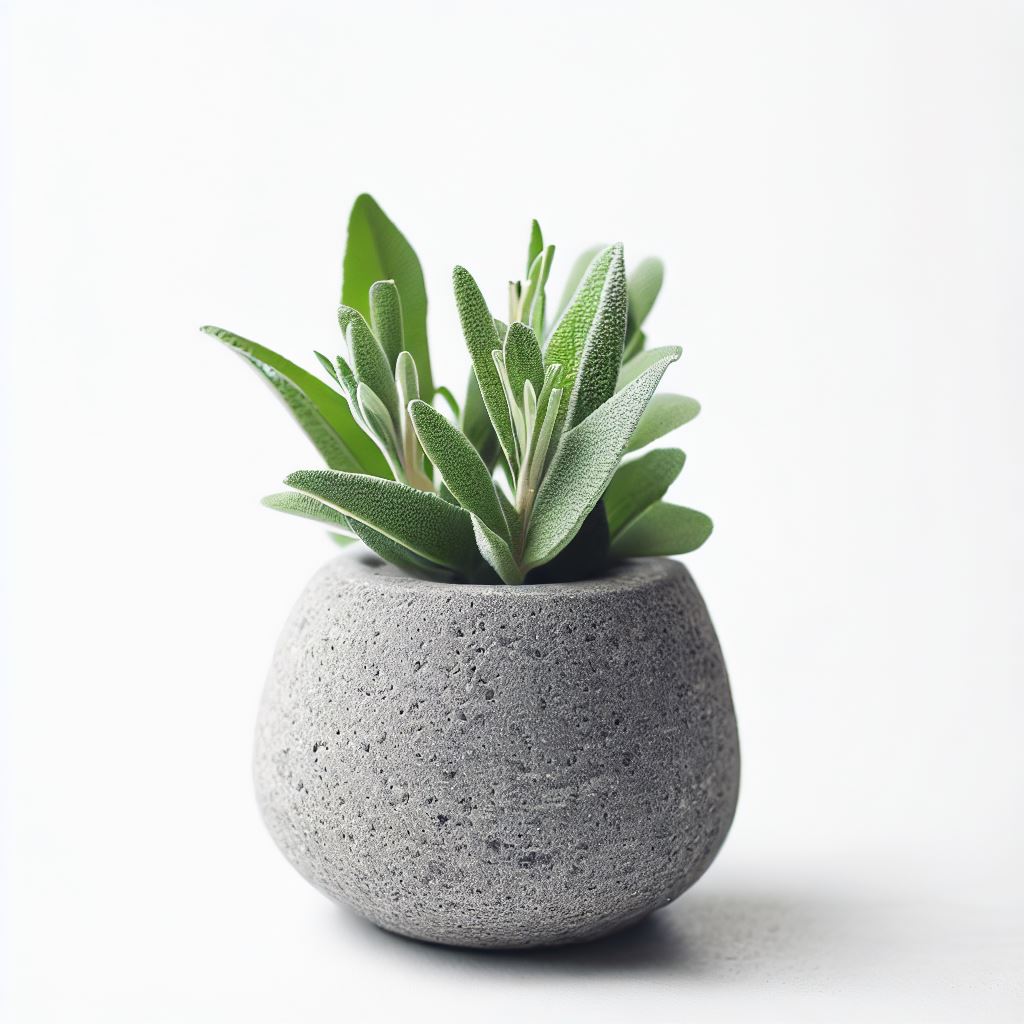
Sage is a herbaceous plant that is commonly used in Mediterranean and Middle Eastern cuisine. It has a slightly bitter, earthy flavor and is often used in stuffing, sausage, and roasted meats. Sage is also known for its medicinal properties, including anti-inflammatory and antimicrobial effects.
Flavor & Aroma: Sage has a strong, earthy flavor with a savory, aromatic scent. Goes Well With: Stuffing, poultry, and pork dishes.
Growing Tips:
- Sunlight: Sage needs at least 5-6 hours of direct sunlight.
- Watering: Keep the soil consistently slightly moist.
- Germination: Sage seeds can take 14-21 days to sprout.
- Difficulty: Intermediate level.
Spearmint (Mentha spicata)
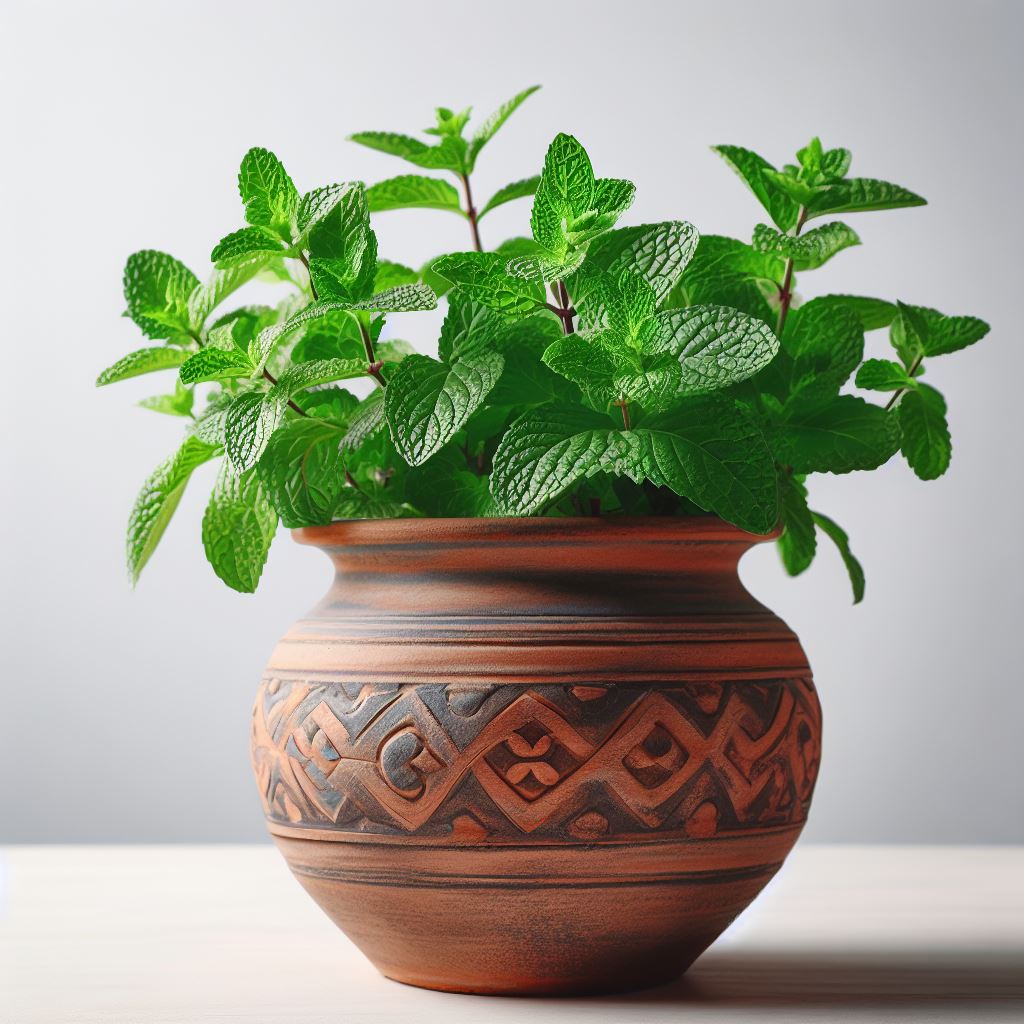
Spearmint is a member of the mint family and has a sweet, minty flavor. It is often used in teas, as a seasoning for lamb and vegetables, and in desserts. Spearmint is also known for its digestive and anti-inflammatory properties.
Flavor & Aroma: Spearmint offers a sweet, minty flavor and a refreshing, spearmint aroma.
Goes Well With: Tea, cocktails, and lamb dishes.
Growing Tips:
- Sunlight: Provide bright, indirect sunlight.
- Watering: Keep the soil consistently moist.
- Germination: Spearmint seeds usually sprout in 10-15 days.
- Difficulty: Beginner-friendly.
Thyme (Thymus vulgaris)
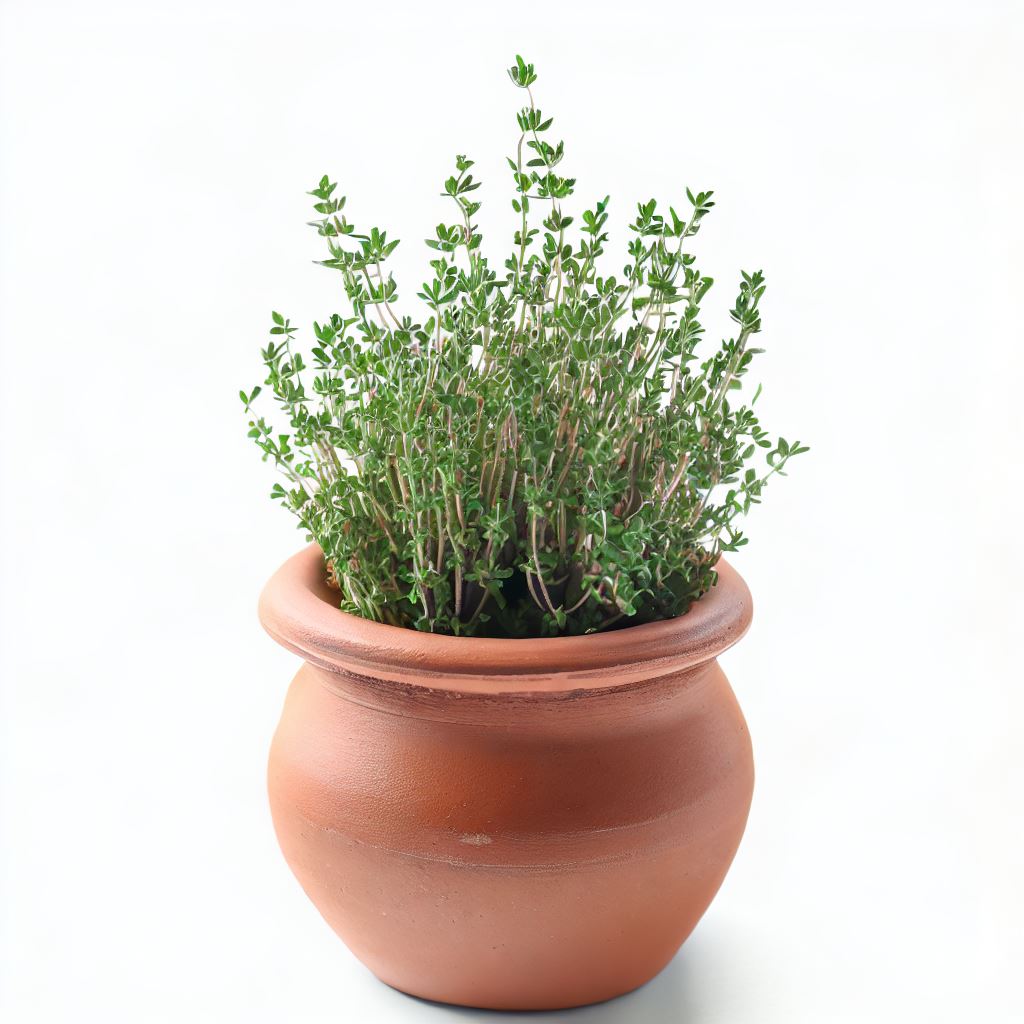
Thyme is a herbaceous plant that is commonly used in Mediterranean and Middle Eastern cuisine. It has a strong, earthy flavor and is often used in soups, stews, and roasted meats. Thyme is also known for its antibacterial and antioxidant properties.
Flavor & Aroma: Thyme provides a subtle, earthy flavor and a fragrant, herbal scent.
Goes Well With: Roasted vegetables, poultry, and stews.
Growing Tips:
- Sunlight: Thyme requires at least 6-8 hours of direct sunlight.
- Watering: Allow the soil to dry out slightly between waterings.
- Germination: Thyme seeds can take 14-21 days to sprout.
- Difficulty: Intermediate, but well worth the effort.
Bay Laurel (Laurus nobilis)
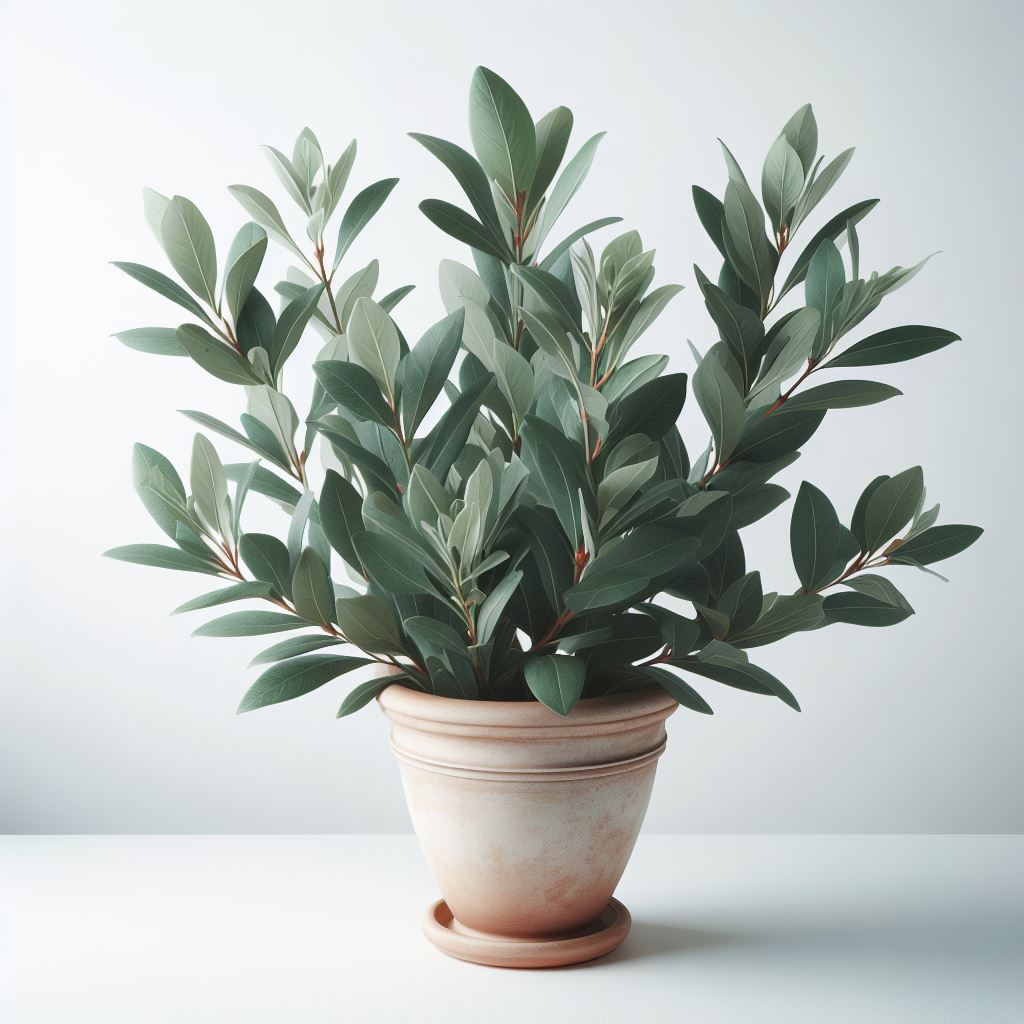
Bay laurel is a tree that is commonly used in M.editerranean cuisine. Its leaves have a strong, slightly bitter flavor and are often used in soups, stews, and sauces. Bay leaves are also known for their medicinal properties, including anti-inflammatory and antimicrobial effects
Flavor & Aroma: Bay leaves have a mild, aromatic flavor and a pleasant, herbal aroma.
Goes Well With: Soups, stews, and sauces.
Growing Tips:
- Sunlight: Bay laurel thrives in bright, indirect sunlight.
- Watering: Keep the soil consistently moist.
- Germination: Bay laurel seeds are slow to sprout, often taking 20-30 days.
- Difficulty: Intermediate to advanced.
Lemongrass (Cymbopogon citratus)
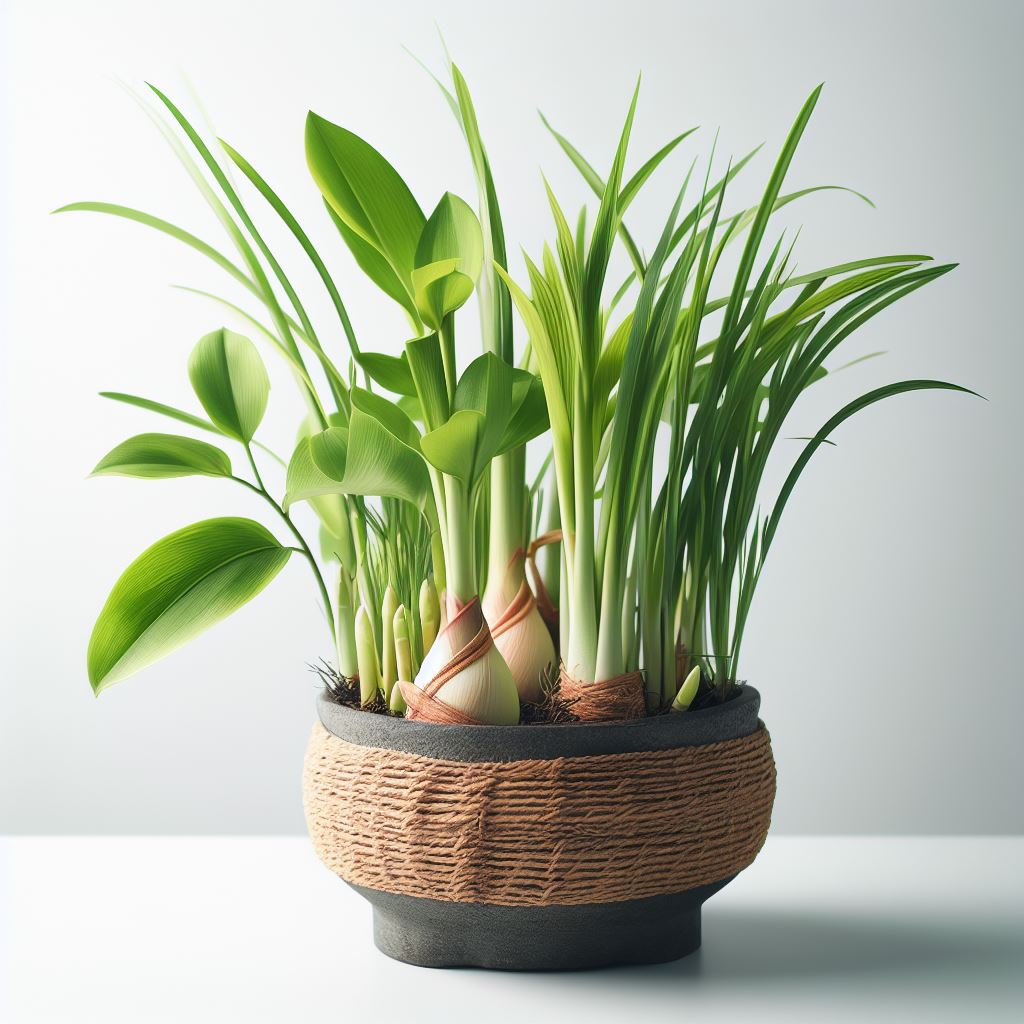
Lemongrass is a herbaceous plant that is commonly used in Southeast Asian cuisine. It has a lemony flavor and is often used in curries, soups, and stir-fries. Lemongrass is also known for its medicinal properties, including anti-inflammatory and antimicrobial effects.
Flavor & Aroma: Lemongrass imparts a zesty, lemony flavor and a fresh, citrusy scent.
Goes Well With: Thai and Asian dishes, soups, and curries.
Growing Tips:
- Sunlight: Lemongrass needs at least 6-8 hours of direct sunlight.
- Watering: Keep the soil consistently moist.
- Germination: Lemongrass can take 7-14 days to sprout.
- Difficulty: Intermediate level.
Marjoram (Origanum majorana)
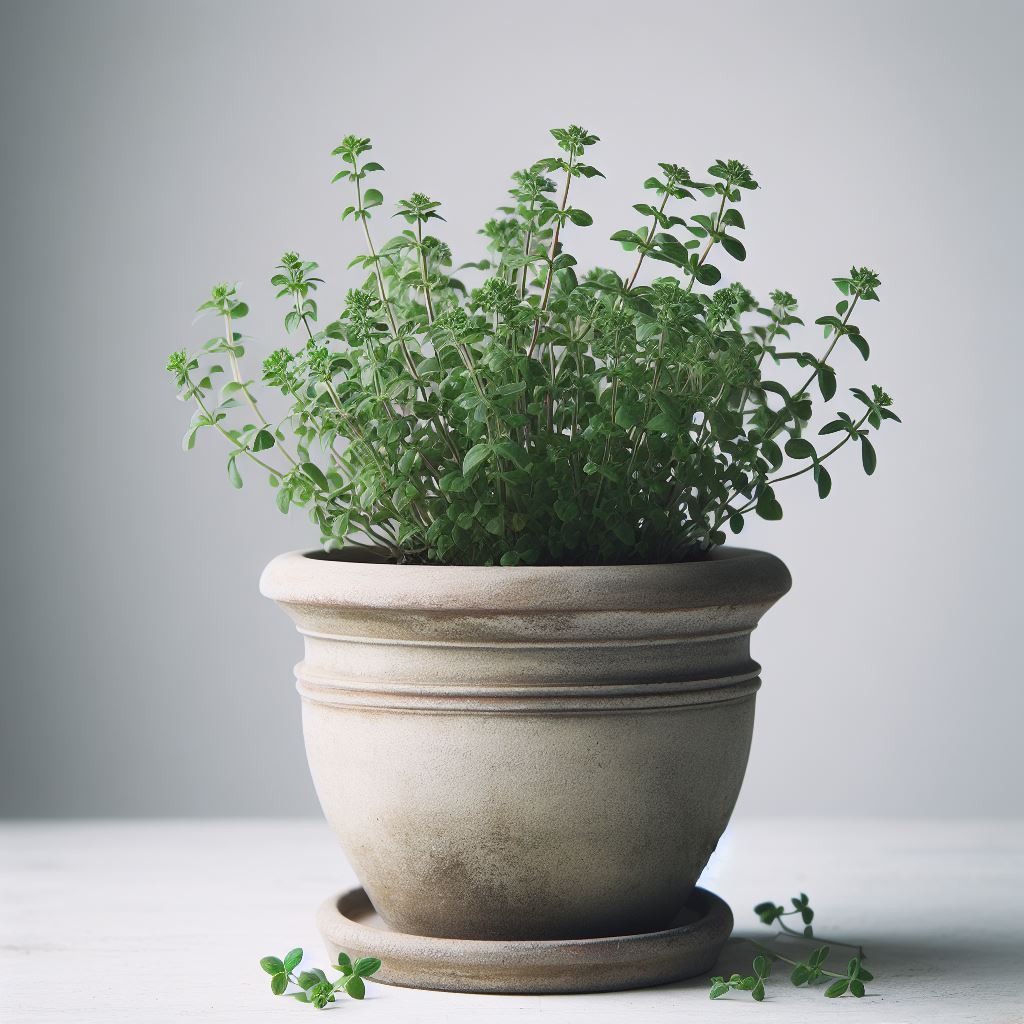
Marjoram is a herbaceous plant that is commonly used in Mediterranean cuisine. It has a sweet, slightly citrusy flavor and is often used in soups, stews, and roasted meats. Marjoram is also known for its medicinal properties, including anti-inflammatory and antimicrobial effects.
Flavor & Aroma: Marjoram offers a delicate, sweet flavor and a subtle, fragrant aroma.
Goes Well With: Tomato dishes, salads, and roasted meats.
Growing Tips:
- Sunlight: Marjoram prefers 4-6 hours of direct sunlight.
- Watering: Keep the soil consistently moist but not waterlogged.
- Germination: Marjoram seeds typically sprout in 7-14 days.
- Difficulty: Beginner to intermediate level.
Parsley (Petroselinum crispum)
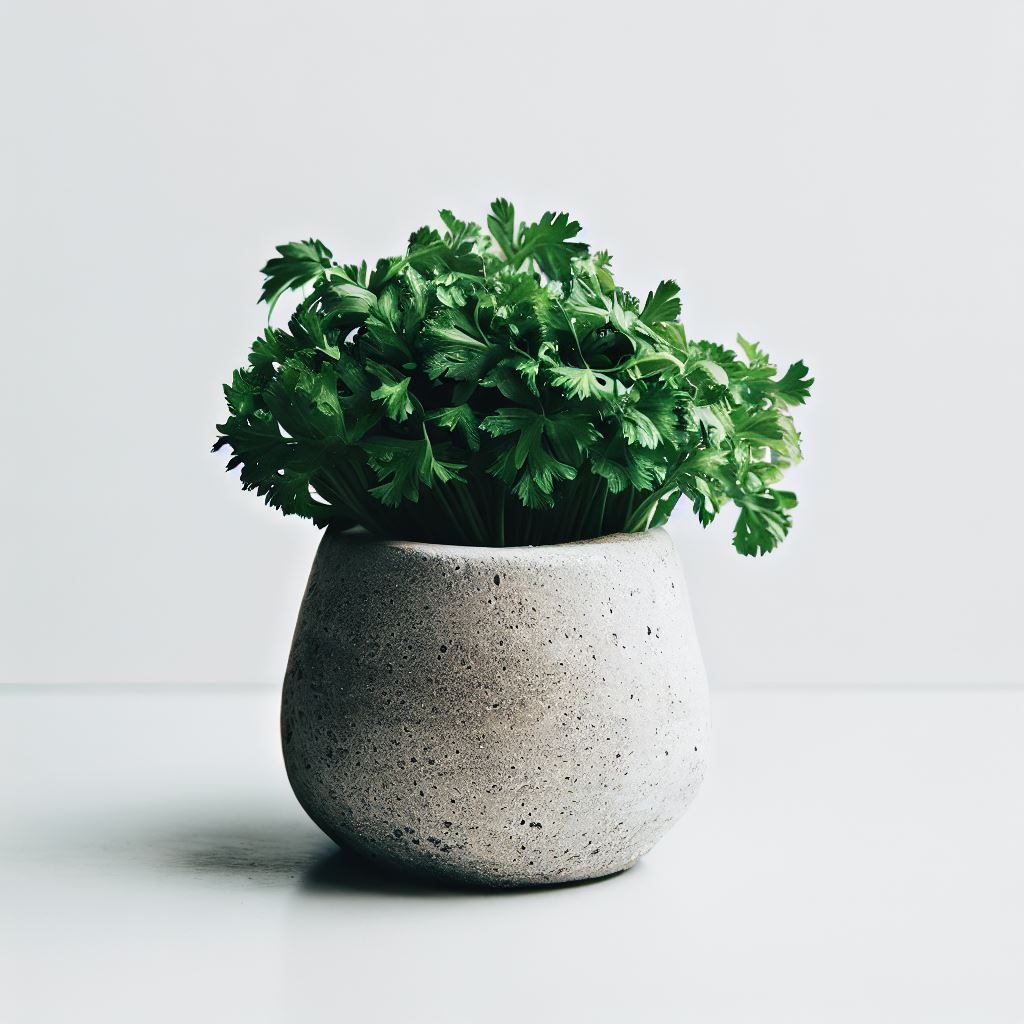
Parsley is a herbaceous plant that is commonly used as a garnish or seasoning in dishes. It has a mild, slightly bitter flavor and is often used in salads, soups, and sauces. Parsley is also a good source of vitamins A and C
Flavor & Aroma: Parsley has a fresh, mild flavor and a slightly peppery, herbal aroma.
Goes Well With: Garnishes, sauces, and salads.
Growing Tips:
- Sunlight: Parsley requires 4-6 hours of direct sunlight.
- Watering: Keep the soil consistently moist.
- Germination: Parsley seeds can be slow to sprout, taking 14-21 days.
- Difficulty: Beginner-friendly.
Coriander (also known as Cilantro) (Coriandrum sativum)
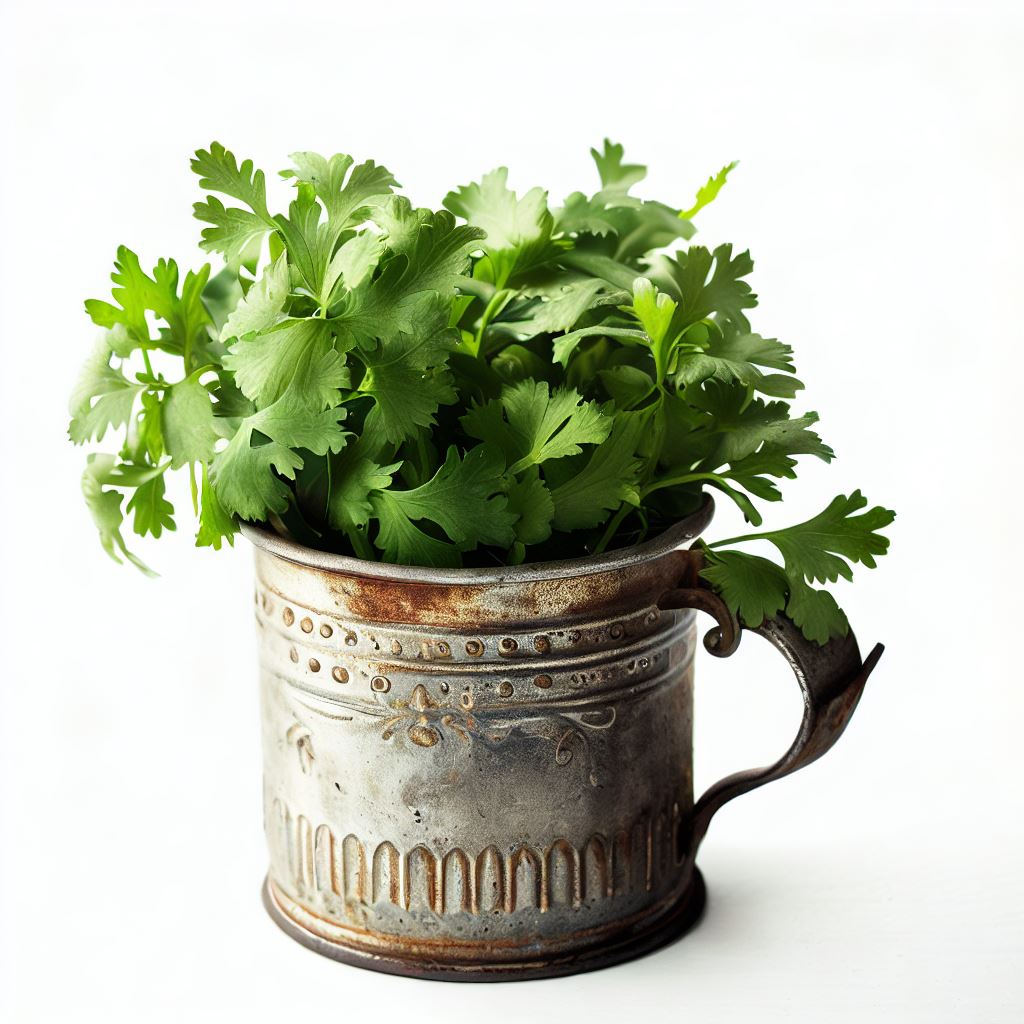
Coriander is a herbaceous plant that is commonly used in Mexican, Indian, and Middle Eastern cuisine. Its leaves are known as cilantro and have a citrusy, slightly bitter flavor. Its seeds are known as coriander and have a warm, slightly sweet flavor. Coriander is also known for its medicinal properties, including anti-inflammatory and antimicrobial effects.
Flavor & Aroma: Coriander has a bright, citrusy flavor and a fresh, slightly tangy aroma.
Goes Well With: Mexican, Indian, and Thai dishes, as well as salsas and guacamole.
Growing Tips:
- Sunlight: Coriander needs at least 4-6 hours of direct sunlight.
- Watering: Keep the soil consistently moist.
- Germination: Coriander seeds can take 7-14 days to sprout.
- Difficulty: Beginner to intermediate level.
Dill (Anethum graveolens)
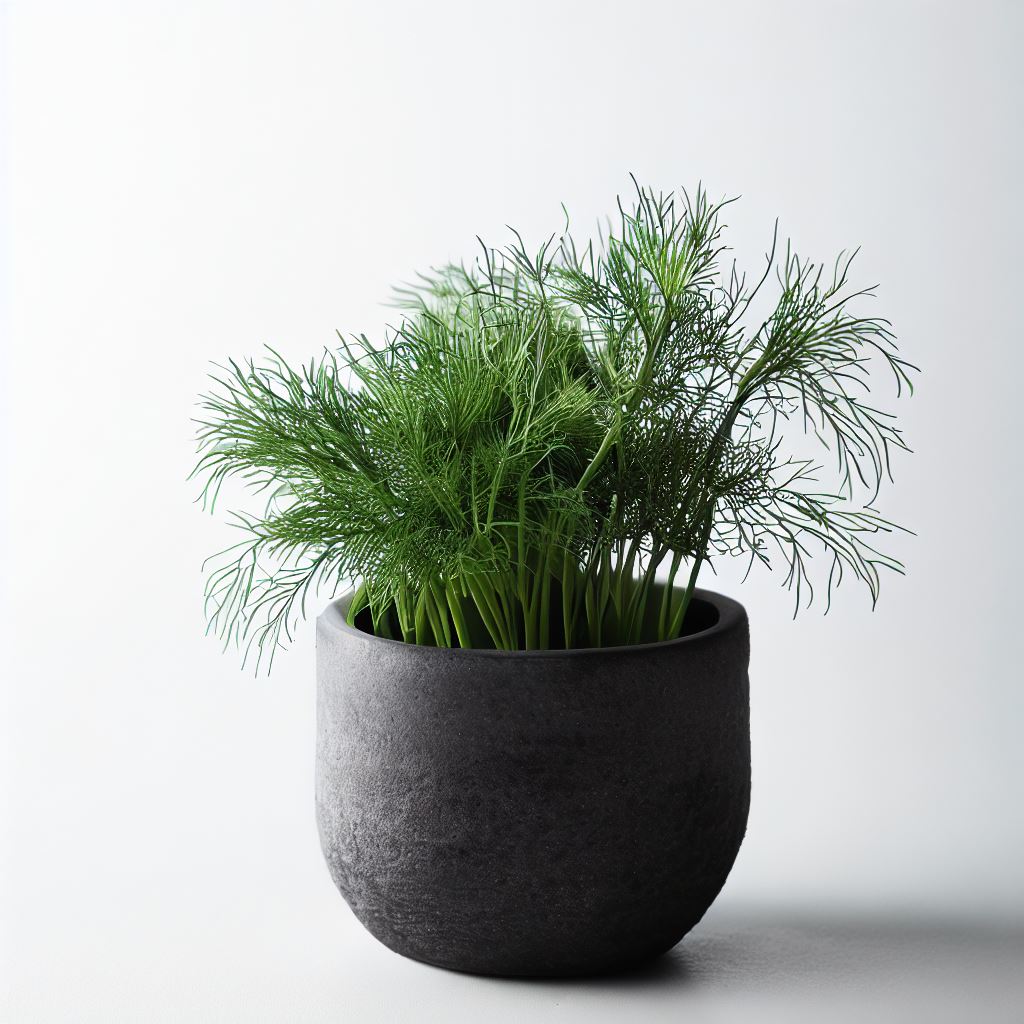
Dill is a herbaceous plant that is commonly used in Scandinavian and Eastern European cuisine. It has a sweet, slightly tangy flavor and is often used in pickles, fish dishes, and salads. Dill is also known for its digestive and antimicrobial properties.
Flavor & Aroma: Dill offers a sweet, tangy flavor and a fresh, slightly anise-like aroma.
Goes Well With: Pickles, fish dishes, and potato salads.
Growing Tips:
- Sunlight: Dill requires 4-6 hours of direct sunlight.
- Watering: Keep the soil consistently moist.
- Germination: Dill seeds typically sprout in 7-14 days.
- Difficulty: Beginner to intermediate level.
Lavender (Lavandula)

Lavender is a herbaceous plant that is commonly used in French and Mediterranean cuisine. It has a floral, slightly sweet flavor and is often used in desserts, teas, and as a seasoning for meats and vegetables. Lavender is also known for its calming and anti-inflammatory properties.
Flavor & Aroma: Lavender has a sweet, floral flavor and an enchanting, calming scent.
Goes Well With: Baking, teas, and as a fragrant addition to dishes and desserts.
Growing Tips:
- Sunlight: Lavender needs at least 6-8 hours of direct sunlight.
- Watering: Allow the soil to dry out between waterings.
- Germination: Lavender seeds can be slow to sprout, taking 14-28 days.
- Difficulty: Intermediate to advanced.
Whether you’re a seasoned gardener or just getting started, these herbs are bound to spice up your life.
Remember, each herb has its unique preferences, so make sure to tailor your care to their specific needs.
Happy gardening!







